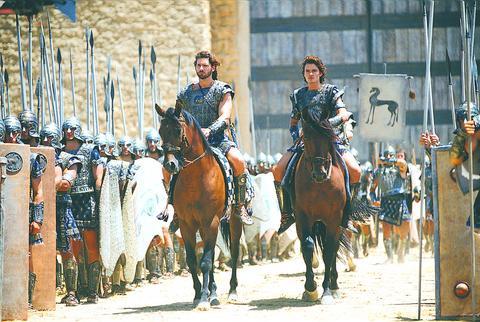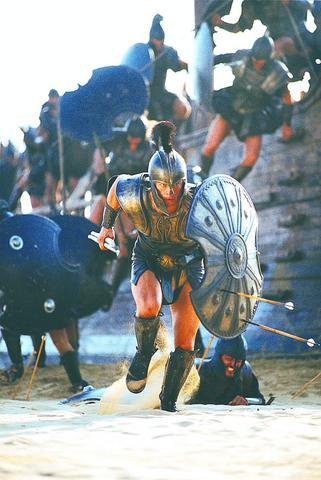This war will never be forgotten. Nor will the heroes who fight in it." This line of dialogue expresses a thought that recurs frequently, with various inflections and in the mouths of various heroes, over the nearly two-and-a-half hours of Wolfgang Petersen's Troy. In one sense, it is less a prophecy than a statement of the obvious, since the names of Achilles, Hector, Odysseus and the rest have endured for 3,000 years. At the same time, though, the endless talk of immortality seems to express the picture's anxious, naive ambition, which is to rise above the welter of summer blockbusters and ascend into the pantheon of movie classics.
This is most unlikely.

PHOTO COURTESY OF WARNER FILMS
But for what it is -- a big, expensive, occasionally campy action movie full of well-known actors speaking in well-rounded accents -- Troy is not bad. It has the blocky, earnest integrity of a classic comic book, and it labors to respect the strangeness and grandeur of its classical sources. Some moments may make you rue the existence of cinema, or at least of movies with sound, since the dialogue often competes with James Horner's score for puffed-up obviousness. But there are others -- crisply edited combat sequences, tableaus of antique splendor, a hugely muscled Brad Pitt modeling the latest in Hellenic leisure wear -- that remind you why you like movies in the first place.

PHOTO COURTESY OF WARNER FILMS
From its opening scenes, Troy, freely adapted by David Benioff from The Iliad and other sources, plunges you into a world shaped by complex codes of honor, loyalty and military virtue. Or, rather, it plunges you into a world where people talk about such things incessantly, and where every speech is punctuated by booming timpani and the ululations of an apparently tongueless female singer, her inarticulate moans announcing that this is not just a movie but an epic. Still, for once there really is a solid epic architecture underneath all the pageantry, and not just a very long movie set in the distant past.
Benioff's script, for all its line-by-line infelicities, shows a real fascination with Homer's great characters and with the nexus of divided loyalties and competing ambitions that led to so much death and destruction. Unlike movies that take war as a simple contest of good and evil, Troy remains faithful to Homer (and to human nature) by understanding war as a political event, with plenty of viciousness and virtue to go around. Like his screenplay for Spike Lee's 25th Hour (based on his own novel), Troy is fundamentally a story about treachery and brotherhood -- about the fallibility and fragile nobility of men.
In other words, it was not all Helen's fault. Helen, played by Diane Kruger, a German model, is perfectly lovely and it is easy to see why she prefers the boyish Paris (Orlando Bloom) to grouchy Menelaus (Brendan Gleeson), the ruler of Sparta. But their puppyish romance is the trivial pretext for the war rather than its true cause. Menelaus' jealousy is exploited by his brother Agamemnon (Brian Cox), who uses the insult to further his imperial ambitions. His chief weapon is the sullen Achilles (Pitt), who in an early scene strolls out of his love tent, like a petulant movie star summoned from his trailer, to dispatch an enormous Thessalonian warrior with a single stroke of the sword.
Achilles' temperament -- a volatile mixture of vanity, cynicism and sentimentality -- is the key to the movie and Pitt attacks the role with the same vigor and agility the character demonstrates in combat. Yes, his accent sounds a bit like Madonna's, perhaps in deference to the mostly English and Australian actors who make up most of the cast, but for once he does not seem embarrassed by his charisma, or driven to subvert it with actorish tics. Achilles' narcissism is like that of a modern celebrity: he fights because it will bring him fame, not to serve the gods or the glory of the Greek nation or, least of all, his corrupt king. His true loyalty is to individuals -- his beloved cousin Patroclus (Garrett Hedlund), his ruthless Myrmidons and his love interest, the captured Trojan priestess Briseis (Rose Byrne) -- rather than to causes.
His Trojan counterpart is Paris' brother, Hector (Eric Bana), who is constrained by the bonds of kinship, duty and patriotism that Achilles disdains. If Achilles is a kind of existentialist rock star, Hector is a stoical family man, protective of his wayward brother, respectful of his father, Priam (Peter O'Toole) and devoted to his wife, Andromache (Saffron Burrows) and their infant son. The events leading up to Hector's duel with Achilles -- a tempest of
failure, deceit and unappeasable emotion -- are the beating heart of Homer's poem and the filmmakers approach them with respectful sobriety, even going so far as to lower the volume on Horner's music. Bana, after his tentative superhero turn in The Hulk, shows more confidence here. His brooding, bearded countenance plays against Pitt's gleaming blondness, and the visual contrast emphasizes the differences between the characters.
Film Notes:
Directed by: Wolfgang Petersen
Starring: Julian Glover (Triopas), Brian Cox (Agamemnon), Brad Pitt (Achilles), Brendan Gleeson (Menelaus), Diane Kruger (Helen), Eric Bana (Hector)), Orlando Bloom (Paris)
Running time: 163 minutes
Taiwan Release: Today

On April 26, The Lancet published a letter from two doctors at Taichung-based China Medical University Hospital (CMUH) warning that “Taiwan’s Health Care System is on the Brink of Collapse.” The authors said that “Years of policy inaction and mismanagement of resources have led to the National Health Insurance system operating under unsustainable conditions.” The pushback was immediate. Errors in the paper were quickly identified and publicized, to discredit the authors (the hospital apologized). CNA reported that CMUH said the letter described Taiwan in 2021 as having 62 nurses per 10,000 people, when the correct number was 78 nurses per 10,000

As we live longer, our risk of cognitive impairment is increasing. How can we delay the onset of symptoms? Do we have to give up every indulgence or can small changes make a difference? We asked neurologists for tips on how to keep our brains healthy for life. TAKE CARE OF YOUR HEALTH “All of the sensible things that apply to bodily health apply to brain health,” says Suzanne O’Sullivan, a consultant in neurology at the National Hospital for Neurology and Neurosurgery in London, and the author of The Age of Diagnosis. “When you’re 20, you can get away with absolute

May 5 to May 11 What started out as friction between Taiwanese students at Taichung First High School and a Japanese head cook escalated dramatically over the first two weeks of May 1927. It began on April 30 when the cook’s wife knew that lotus starch used in that night’s dinner had rat feces in it, but failed to inform staff until the meal was already prepared. The students believed that her silence was intentional, and filed a complaint. The school’s Japanese administrators sided with the cook’s family, dismissing the students as troublemakers and clamping down on their freedoms — with

As Donald Trump’s executive order in March led to the shuttering of Voice of America (VOA) — the global broadcaster whose roots date back to the fight against Nazi propaganda — he quickly attracted support from figures not used to aligning themselves with any US administration. Trump had ordered the US Agency for Global Media, the federal agency that funds VOA and other groups promoting independent journalism overseas, to be “eliminated to the maximum extent consistent with applicable law.” The decision suddenly halted programming in 49 languages to more than 425 million people. In Moscow, Margarita Simonyan, the hardline editor-in-chief of the